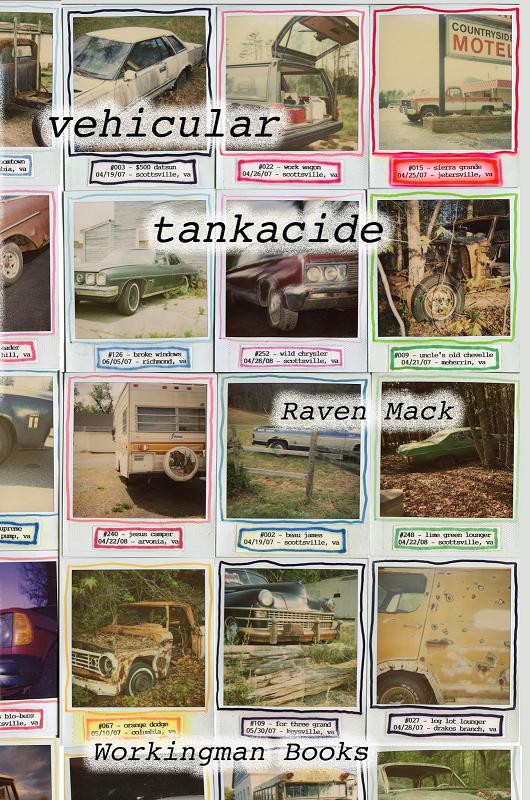I’ve previously let you know about Raven Mack, a writer/zinester/poet/wandering spirit from the Charlottesville area, and his recent quest to bring poetry to the masses through his Rojonekku Hand To Hand Haiku Tournaments. But those events aren’t the only things Raven’s up to right now; not only does he continue to produce zines (see the ongoing One Thousand Feathers project), he’s also self-published a couple of books. His latest is Vehicular Tankacide, a new collection of poetry written in classic Japanese tanka form.
I’ve previously let you know about Raven Mack, a writer/zinester/poet/wandering spirit from the Charlottesville area, and his recent quest to bring poetry to the masses through his Rojonekku Hand To Hand Haiku Tournaments. But those events aren’t the only things Raven’s up to right now; not only does he continue to produce zines (see the ongoing One Thousand Feathers project), he’s also self-published a couple of books. His latest is Vehicular Tankacide, a new collection of poetry written in classic Japanese tanka form.
Everybody knows about haiku, but what is far less known is the larger poetic form haiku was originally part of; tanka consist of a haiku verse in the three-line, 5-7-5 syllable structure, followed by a two-line verse with 7 syllables in each line. The tanka in this collection were inspired by Raven’s contemplation of the environmental damage he does every time he drives his truck. Attempting to compensate, spiritually if not physically, for his own carbon footprint, he began writing three tanka poems for every time he turned the key in his truck’s ignition. These poems were composed on 3×5 index cards he kept in the cab of his truck.
Raven explains all of this in the book’s introduction, and in a much more engaging manner. His narrative voice is casual and friendly, and as always, his words communicate a vivid impression of his unique personality. The main body of Vehicular Tankacide consists of 15 “quilts,” each of which is an assemblage of two-verse tanka, crazy-quilt style, into a longer chapter-style section. The poems are assembled according to loose themes, and are not united by anything so logical as chronology. However, they do fall into their own abstract patterns despite the somewhat random juxtapositions. Certain recurring images, topics, and lines of thought emerge, which help to form an impression of what Raven’s daily life is like. Each verse contributes a tiny detail, and these details add up across the length of the book.
It’s clear that Raven’s background is impossible to ignore over the course of his daily life; living as a working-class denizen of rural Virginia, from a cultural tradition some (including Raven himself) might describe as “redneck” or “hillbilly,” affects his interactions with typical middle-class urban yuppie types. In his poetry, he records both their reactions to him and his own reactions to them. Living the sort of struggle to get by that many people with a well-to-do background will never understand gives a person a different perspective than the default worldview pushed by America’s mainstream media. The moments in Vehicular Tankacide in which Raven describes his perspective meeting and clashing with that of people who’ve never considered a viewpoint other than their own are some of the most powerful the book has to offer.
Attempting to avoid the path of least resistance and stick to the guidance of your own moral compass, regardless of what the wider world wants, is a daily struggle, especially when finances are limited. That struggle comes through in many places throughout Vehicular Tankacide. But there’s just as much emphasis throughout the book on the beauty day-to-day life has to offer; Raven’s interactions with nature, especially his attempts to communicate with birds and squirrels, are always charming. The occasional stanzas in which an event outside the normal routine occurs also offer unexpected delight, as suddenly, for 5 lines, Raven is under his house attempting a heating repair, or walking along a railroad track pondering hobo graffiti. All of these moments add up to a life, and Vehicular Tankacide is a reminder that all lives are meaningful and beautiful, even those mostly occupied by a day-to-day struggle just to get by. Perhaps especially those.

Order Vehicular Tankacide in paperback and Kindle e-book form from Amazon HERE, or in all e-book formats from Smashwords HERE. Alternately, you can pick up a paperback copy from Raven himself when he returns to Richmond on Wednesday, April 23 for the next edition of the Rojonekku Hand To Hand Haiku Tournament, taking place at Balliceaux (203 N. Lombardy St) starting at 8 PM. Bring 20 or so haiku if you want to compete, or just come empty-handed and watch the whole thing go down. Admission is free. For more info, click here.



